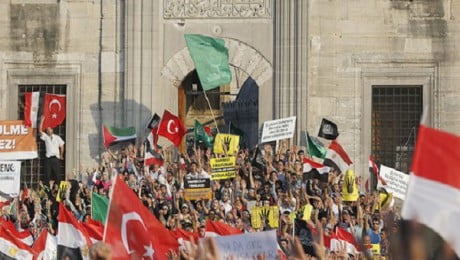Opinions

Future of political islam: lessons from Turkey, Egypt
The eruption of protests across the country in the summer of 2013 were a result of the AKP’s increasingly authoritarian governing style. Rather than reading these protests as a public expression of discomfort — and taking the recent corruption charges seriously before declaring them a conspiracy against the government by the rival Gulen movement — the government is currently pushing legislation within parliament that will not only abolish the separation between the judiciary and the executive but which will completely consolidate the judicial and executive powers at the hands of the government.

I am concerned: Erdoğan and elections
Current developments are disturbing. It does not take an oracle to guess that when the elections get even closer, the country will move further towards insanity if Erdoğan does not change his stance on a number of issues and cease his ferocious rhetorical tactic of designating every critic a traitor. Hrant Dink was assassinated as a result of such a campaign of hate.

On Hizmet exceptionalism
What is perhaps saddest about this witch-hunt is that Hizmet is a priceless resource for any government. It serves without any burden on public funds and efforts. It is a rich source of reliable manpower devoted to selfless service and ready to raise the banner of Turkey, on peaceful terms, alongside the flags of all other nations around the world. Instead of being propelled by this free energy, and benefitting from its resources, the Turkish government acts in jealousy, and tries to destroy it.

We could not have imagined so many insults
They hope to cover up the corruption investigation and the reassignment of thousands of police officers and dozens of prosecutors and judges that had been planned much earlier. When the prime minister opted to use the language of insult, his copycat ministers and deputies who want to be popular with the prime minister began to use even more violent language.

The Encyclopedia of Islam and hate speech
Erdoğan’s obvious target was Fethullah Gülen, but it is clear that he also attacked anyone who doesn’t think like him with phrases such as “false prophets,” “fake mystics” and “so-called scholars.” This denigration is problematic especially in terms of secularism. Indeed, the prime minister hurls gross insults at religious interpretations that diverge from his own. In his capacity as a prime minister, he imposes his beliefs and acts onto those who do not think like him. One step beyond these remarks would be the prime minister’s supporters’ resorting to violence against those he places on the bull’s eye.

Erdoğan’s AKP runs out of steam, then what?
We are now in the midst of a system crisis with unprecedented dimensions and unforeseen consequences. Turkey’s fiercely embattled Prime Minister Recep Tayyip Erdoğan is betting whatever the country has gained over the past years on a game of prospects that will either lead to a downfall, or turn the stakes in such favor for himself so as to speed up his irresistible rise to untouchability.

Losing rationality in politics and the economy
Turkey has a weak record of institutionalization. Despite the “We are a big state” narrative, today, Turkey’s political model is simple: the leader and the nation. Lacking effective institutions that can accommodate political fluctuations, crises of various calibers can harm Turkey’s stability easily.

Hizmet movement and Kurdish question in Turkey
Through educational projects, the Hizmet movement helped to alter the social fabric of Turkish people who consciously or otherwise supported the institutional resistance of state and governmental bodies. Through dialogue and face-to-face encounters, Turkish people have had the chance to experience and feel the grievances of their Kurdish brothers and sisters and listen to their stories.

Gulen Movement, civilian governments and the AK Party
The Gulen movement’s understanding of politics and the political process differentiate it from the military and bureaucratic elite. Its main political objective is to transform society by raising the moral consciousness of individuals. By raising moral consciousness, the movement hopes to cleanse the bureaucracy of widespread corruption, increase the efficiency and transparency of state institutions, reinvigorate public work ethic to serve the people in order to enhance the legitimacy of the state, and create opportunity spaces for marginalized sectors of the Anatolian population.

Government as a black propaganda machine
In an effort to distract public opinion from the graft probe and the alleged involvement of the prime minister and his inner circle in corruption, Erdoğan has been conducting psychological warfare. Considering the Hizmet movement responsible as the force behind the investigation, Erdoğan declared the movement an enemy.

AKP winning perception war !
The probe, which many predicted to be the end of the Justice and Development Party (AKP), has become a war of perception. If you google “graft,” “bribery” or “corruption” in Turkish, you will see the focus has already shifted to a concept so far unheard of in Turkish politics (the “parallel state”), reassigning public prosecutors and police officers to different posts, condemning all sorts of “disinformation” and changing laws governing the structure of the judiciary.

Was prime minister able to convince the EU?
Prime Minister Recep Tayyip Erdoğan makes all of his political reinforcement in the judicial system. He uses all his political power, charisma and charm to block the corruption probes. For this reason, instead of convincing the EU, he tries to secure a temporary peace so that he can finish his job.




















